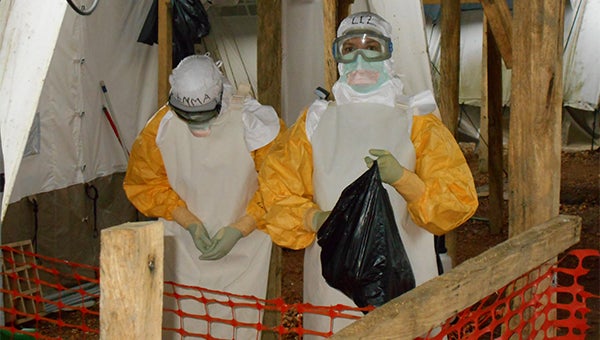Those most dangerous places, continued
Published 10:00 pm Tuesday, November 8, 2016
In my last column I introduced you to my stepdaughter, Lisabeth List, and her partner, Voitek Asztabski. I recently had an opportunity to visit with them while they were taking a break from their regular careers, working with Doctors Without Borders/Médecins Sans Frontières (MSF), and the United Nations World Health Organization (WHO).
My column this week will describe the Ebola mission plus their answers to my question, “Is there one experience or person, thinking back over the years, that tells you it’s all been worth it?”
In the book by Fredrik Bachman, “My Grandmother Asked Me To Tell You She’s Sorry,” the author describes the grandmother’s frequent missions as a doctor who often worked in the dangerous areas of the world.
Trending
“When Granny was headed to some far-off place, you could be sure of only one thing: that it was a place everyone else was trying to get away from.” This described the Ebola mission. Lisabeth was in Sierra Leone and hands-on during this crisis. She was one of the people you saw suited up from head to toe, eyes protected with airtight goggles, unloading the sick, the dying, and those already deceased from ambulances.
“The suits were actually quite claustrophobic,” Lisabeth remembers. “The goggles would fog up. It was difficult to see and, of course, you couldn’t remove them or expose any skin. You just had to know where you were going!”
Voitek had less direct contact with those suffering as he was stationed in Freetown, Sierra Leone, dealing with the logistics of providing needed supplies. They both remember a co-worker becoming ill with malaria. They laugh as they remember, “It was a relief to hear she was only sick with malaria.”
Returning to the states after this mission was difficult. They were met by Homeland Security departing Europe and again on arrival in the U.S. In Dallas, a security agent drove them home to avoid any exposure in a cab or public transportation. The house was under surveillance for an extended period of time.
Most recently they have returned from Yemen, working with WHO. Lisabeth recently earned a master’s degree in public health from the Royal Tropical Institute in Amsterdam. In Yemen she was the public health officer responsible for mobile health units, establishing surgical teams, and determining the public health needs such as health kits, ambulances, and drugs. She had to submit financial proposals to secure donations from neighboring countries like Kuwait, Saudi Arabia, UAE, and the U.S.
Voitek received a master’s degree in disaster management from the University of Copenhagen. In Yemen he has been involved developing a supply chain to get things into the country, to be distributed to the hospitals and clinics.
Trending
“Because of the civil war in Yemen,” he tells me, “it’s not easy to ship directly into Yemen. Supplies first go to Djibouti where they are stored and prepared to be shipped into Yemen.” Djibouti’s relative stability has made it a prized location for foreign military bases and ensured a steady flow of foreign assistance. It’s a principal maritime port for imports and exports.
Listening to their stories of the many places they have been assigned, I wondered if there was one person or event that stood out, that they often think back on, making all the sacrifices and exposure to dangerous conditions worth it.
Lisabeth’s answer comes quickly.
“There was a woman in Darfur. She had two sons. Their father had been murdered. She had been shot and was suffering from three different wounds. They came from a remote village and her sons transported her in a cart pulled by a donkey for four to five days to our center. We had to give her anesthetic everyday just to clean the wounds. In spite of the trauma she had experienced, she told us ‘Thank God I’m alive’. I knew then that if she was the only person I saved, it was all worth it.”
The experience that Voitek related was more recent. He had signed on to a mission with MSF to assist on a ship with the Italian navy, searching for refugees in the Mediterranean to be picked up and brought to safety.
“We would search the waters with binoculars. When we located a raft we would deploy rescue vessels. There could be 130 people on one of the rafts. Sometimes people would already be dead from asphyxiation from the fumes, or they would have burns from the fuel. The first rescue that I was on, their boat was sinking. The engine had quit working and they were drifting for eight hours. Water had filled the interior and people had actually drowned in the boat. Twenty-eight people were dead and we saved 105.”
He continues, “Sometimes when they would see our rescue boat they would jump in the water to be saved, but they were too exhausted and they would drown. We could hold 500 refugees on our ship. They were mostly men, but some women, children, and babies. Some were naked, some in shock, traumatized. They would pray and kiss the boat. It’s been worth it. And I’ve developed sides of my character that I didn’t know I had.”
And how long will they continue this work?
They both agree, “As long as we are physically and mentally able, as long as we are enjoying the work, and feeling fulfilled.” The next time the world erupts, they will be there.






